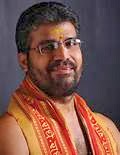Two Topics in the Veda :
A human being has a number of desires.
And the desires of a given person need not be the desires of another person.
Further, a person who has a desire now many not have the same desire later even though it was not fulfilled.
He may grow out of it.
Thus, these desires (kamah) are many and varied (binnah).
In order to fulfill these desires, a person makes attempts according to his skill and knowledge, but still, there are many hidden variables.
To control the hidden variables one resorts to prayer This kind of prayer, a specific prayer to get a given result is mentioned in the first part of the Veda There are many such prayers for the many different ends.
Finally, at the end, the Veda has a topic called Vedanta.
This topic deals with the desirer.
It is important to understand the difference between these two topics.
One deals with your desires; it tries to help you to fulfill your desires.
The other deals with the very desirer.
Why am I a desirer?
Even if I fulfill a few desires, I am not going to say that I have fulfilled all my desires.
There were desires that I could not fulfill when I was young.
Even now there are desires that I cannot fulfill-desires like those for an ideal society, an ideal disposition of a friend or spouse that you always dream of These desires are never met with and perhaps will never be met with.
One can never relax saying, “I have fulfilled all my desires.”
Swami Dayananda Saraswati




Comments